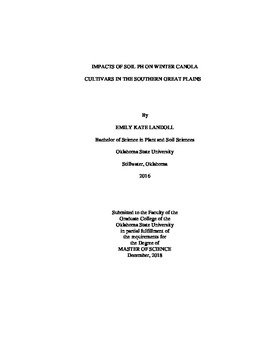| dc.description.abstract | Winter canola (Brassica napus L.) is an important rotational crop for wheat systems in the Southern Great Plains, which possess a wide range of acidic soils. However, unlike many other crops, most winter canola cultivars have not been evaluated for pH and Al3+ tolerance. Four field trials were established over two growing seasons to evaluate four winter canola cultivars on pre-adjusted pH gradients. Generally, canola yields were positively influenced by increasing soil pH, with high yields coming from more neutral pH. However, response of canola yields to pH differed by location and cultivar. Critical soil pH was only found at one site year, with critical pH values much lower than previous evaluations (pH 3.90). Environmental conditions at planting paired with fewer data points above could have contributed to this variable response. At the Chickasha location, soil pH and extractable Al had a limited relationship, with low levels of Al3+ found, indifferent of soil pH (r2= 0.03). Variation in yields at Chickasha were potentially better explained by other production factors, not changing pH. In addition, a greenhouse study was established to analyze the potential of poultry litter biochar to alleviate extractable Al3+ in soil systems. Four biochar treatments were analyzed: 2.24 Mg ha-1, 5.6 Mg ha-1, and 11.21 Mg ha-1 as well as a control. In the greenhouse evaluation, 2.24 Mg ha-1 biochar application had a positive effect on alleviating extractable Al3+ from the soil. Higher application rates of biochar on soil also alleviated Al3+ concentration, but not at a significant amount to justify the necessity of higher application rates. Applications of 2.24 Mg ha-1 reduced Al3+ concentration by 28.23 mg kg-1 while at an application of 5.6 Mg ha-1 concentrations were only further reduced by 10.07 mg kg-1. Results from these studies indicated canola grain yields were impacted by the factors associated with soil acidity. These results highlight the continual evaluation of currently and newly available winter canola cultivars for their tolerance of soil acidity. Furthermore, growers should be knowledgeable of canola cultivar, soil pH and exchangeable Al3+ when determining the feasibility of winter canola in their production systems. | |
